|
|
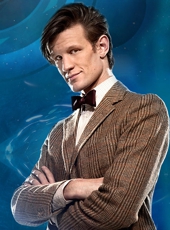 |
|
The
Eleventh Doctor
(2010 - 2013) |
|
| |
|
|
|
The
Sound Vault |
|
 |
|
 |
|
| Amy
Pond |
|
|
The Best Doctor
|
| |
| Vote
if I am your favourite Doctor |
|
|
|
|
|
 Although physically the youngest incarnation of The Doctor shown to date, the Eleventh Doctor often found himself particularly worn down by his greater age at this point, his youthful energy countered by his grief over the hard experiences he had endured over the centuries, as well as his own self-loathing of his perceived failures. Although physically the youngest incarnation of The Doctor shown to date, the Eleventh Doctor often found himself particularly worn down by his greater age at this point, his youthful energy countered by his grief over the hard experiences he had endured over the centuries, as well as his own self-loathing of his perceived failures.
 |
| The Eleventh Hour |
|
 When this incarnation began, the Eleventh Doctor found himself hurtling through the air in a TARDIS that had been damaged during his last regeneration ("The End of Time"), crash-landing in a small garden where he immediately met the seven-year-old Amelia Pond, becoming intrigued by her obvious fear over a crack in her wall when she showed no sign of being scared of him. Despite his initial post-regenerative trauma leaving him disorientated, along with the TARDIS having sustained damage that required it to seal The Doctor out while it repaired itself, The Doctor - after taking an unintended hop forward twelve years - was able to save the world in general and Amy in particular from the actions of Prisoner Zero, a mysterious multi-form being that had been hiding in Amy's spare room since it escaped its prison through a crack in time (The crack in Amy's wall). With the world safe and the TARDIS fully operational once more, The Doctor invited Amy to travel with him - having immediately bonded with her due to her being the first face he ever saw in this body ("The Power of Three") -, beginning a new life for the incarnation that could simultaneously appear like the youngest and oldest Doctors. When this incarnation began, the Eleventh Doctor found himself hurtling through the air in a TARDIS that had been damaged during his last regeneration ("The End of Time"), crash-landing in a small garden where he immediately met the seven-year-old Amelia Pond, becoming intrigued by her obvious fear over a crack in her wall when she showed no sign of being scared of him. Despite his initial post-regenerative trauma leaving him disorientated, along with the TARDIS having sustained damage that required it to seal The Doctor out while it repaired itself, The Doctor - after taking an unintended hop forward twelve years - was able to save the world in general and Amy in particular from the actions of Prisoner Zero, a mysterious multi-form being that had been hiding in Amy's spare room since it escaped its prison through a crack in time (The crack in Amy's wall). With the world safe and the TARDIS fully operational once more, The Doctor invited Amy to travel with him - having immediately bonded with her due to her being the first face he ever saw in this body ("The Power of Three") -, beginning a new life for the incarnation that could simultaneously appear like the youngest and oldest Doctors.
 Although he remained a good man, one of the Eleventh Doctor's most distinctive traits was a greater awareness of his own inner darkness than some incarnations. During an encounter with psychic pollen that had infected the TARDIS, The Doctor, Amy and Rory were trapped in a dream with a manifestation of The Doctor's dark side that introduced himself as the 'Dream Lord', trying to trap them between two dreams ("Amy's Choice"), The Doctor identifying the Dream Lord as his own dark side on the grounds that only one person could hate him that much. On a later occasion, The Doctor led a small army of his own allies against another army assembled by the mysterious 'Silence' for the sole purpose of killing him, one of The Silence's soldiers noting that 'Doctor' had come to mean 'warrior' in some languages of the universe due to The Doctor's own reputation, regardless of its original connotations as a healer. During this encounter, when the group's leader claimed that he wouldn't be a threat because 'Good men have too many rules', The Doctor grimly informed her that good men didn't need rules, and that testing him when she had taken his companion prisoner would not be a good day to learn why he had so many ("A Good Man Goes to War"). After a period of travelling alone, The Doctor once nearly threatened a wanted criminal who sought redemption for his past sins because he declared that he was sick of trying to show mercy only for his enemies to kill again, requiring his companion to remind him that moments like that were what he sought to avoid by travelling with others ("A Town Called Mercy"). Although he became overly critical of his own motives, The Doctor naturally retained his hatred of the Daleks, noting in a confrontation with the Dalek Parliament that they kept coming up with ways to make him sick when they revealed that they perceived hatred as beautiful ("Asylum of the Daleks"), and taking a certain pleasure in appearing before a damaged Dalek when he attempted to access its memory to learn more about the Silence ("The Wedding of River Song"), although he showed sympathy for Oswin Oswald after learning that she had been transformed into a Dalek by the Asylum's security system ("Asylum of the Daleks"). Although he remained a good man, one of the Eleventh Doctor's most distinctive traits was a greater awareness of his own inner darkness than some incarnations. During an encounter with psychic pollen that had infected the TARDIS, The Doctor, Amy and Rory were trapped in a dream with a manifestation of The Doctor's dark side that introduced himself as the 'Dream Lord', trying to trap them between two dreams ("Amy's Choice"), The Doctor identifying the Dream Lord as his own dark side on the grounds that only one person could hate him that much. On a later occasion, The Doctor led a small army of his own allies against another army assembled by the mysterious 'Silence' for the sole purpose of killing him, one of The Silence's soldiers noting that 'Doctor' had come to mean 'warrior' in some languages of the universe due to The Doctor's own reputation, regardless of its original connotations as a healer. During this encounter, when the group's leader claimed that he wouldn't be a threat because 'Good men have too many rules', The Doctor grimly informed her that good men didn't need rules, and that testing him when she had taken his companion prisoner would not be a good day to learn why he had so many ("A Good Man Goes to War"). After a period of travelling alone, The Doctor once nearly threatened a wanted criminal who sought redemption for his past sins because he declared that he was sick of trying to show mercy only for his enemies to kill again, requiring his companion to remind him that moments like that were what he sought to avoid by travelling with others ("A Town Called Mercy"). Although he became overly critical of his own motives, The Doctor naturally retained his hatred of the Daleks, noting in a confrontation with the Dalek Parliament that they kept coming up with ways to make him sick when they revealed that they perceived hatred as beautiful ("Asylum of the Daleks"), and taking a certain pleasure in appearing before a damaged Dalek when he attempted to access its memory to learn more about the Silence ("The Wedding of River Song"), although he showed sympathy for Oswin Oswald after learning that she had been transformed into a Dalek by the Asylum's security system ("Asylum of the Daleks").
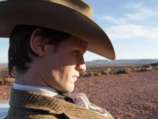 |
| The Impossible Astronaut/Day of the Moon |
|
 The Doctor often appeared to have more faith in humanity than his predecessors; on one notable occasion, he deliberately stepped back from a human/Silurian peace conference to allow his companion Amy to take the lead in the debate ("The Hungry Earth/Cold Blood"), in contrast to his previous self stating that he had 'earned the right' to speak for humanity ("The Sontaran Stratagem/The Poison Sky"). Despite this, he was still willing to prioritise when the situation called for it to ensure that his companions focus on their own survival, such as telling Amy that she was dying after being 'possessed' by a Weeping
Angel so that he could focus on trying to save her ("The Time of Angels/Flesh and Stone"). As with all Doctors, he was willing to sacrifice himself for others if the situation called for it, to the point that he once willingly undertook a plan that resulted in him being left trapped outside the universe to restart the Big Bang and restore reality even knowing that it would erase him from history ("The Pandorica Opens/The Big Bang") (Although Amy was later able to save him, evidence suggests that The Doctor didn't know she would succeed), as well as expressing a willingness to destroy a nuclear submarine while he was on board to stop an Ice
Lord triggering a nuclear war ("Cold War"). He also demonstrated a dislike of endings, to the point that he once revealed that he never read the last page of books to spare him dealing with their conclusions ("The Angels Take Manhattan"), although he still appeared fairly comfortable with his past, keeping various mementos of his past incarnations in his study ("TARDIS"). This dislike of endings makes it particularly ironic that this Doctor was not only forced to visit his future grave during his last confrontation with The Great Intelligence ("The Name of The Doctor") as part of the Intelligence's attempt to kill him, but he was also the final Doctor despite being officially the eleventh rather than the thirteenth (The War Doctor was not counted as a Doctor as he never went by that title in the War and the Tenth Doctor once regenerated while keeping the same face) ("The Time of The Doctor"). The Doctor often appeared to have more faith in humanity than his predecessors; on one notable occasion, he deliberately stepped back from a human/Silurian peace conference to allow his companion Amy to take the lead in the debate ("The Hungry Earth/Cold Blood"), in contrast to his previous self stating that he had 'earned the right' to speak for humanity ("The Sontaran Stratagem/The Poison Sky"). Despite this, he was still willing to prioritise when the situation called for it to ensure that his companions focus on their own survival, such as telling Amy that she was dying after being 'possessed' by a Weeping
Angel so that he could focus on trying to save her ("The Time of Angels/Flesh and Stone"). As with all Doctors, he was willing to sacrifice himself for others if the situation called for it, to the point that he once willingly undertook a plan that resulted in him being left trapped outside the universe to restart the Big Bang and restore reality even knowing that it would erase him from history ("The Pandorica Opens/The Big Bang") (Although Amy was later able to save him, evidence suggests that The Doctor didn't know she would succeed), as well as expressing a willingness to destroy a nuclear submarine while he was on board to stop an Ice
Lord triggering a nuclear war ("Cold War"). He also demonstrated a dislike of endings, to the point that he once revealed that he never read the last page of books to spare him dealing with their conclusions ("The Angels Take Manhattan"), although he still appeared fairly comfortable with his past, keeping various mementos of his past incarnations in his study ("TARDIS"). This dislike of endings makes it particularly ironic that this Doctor was not only forced to visit his future grave during his last confrontation with The Great Intelligence ("The Name of The Doctor") as part of the Intelligence's attempt to kill him, but he was also the final Doctor despite being officially the eleventh rather than the thirteenth (The War Doctor was not counted as a Doctor as he never went by that title in the War and the Tenth Doctor once regenerated while keeping the same face) ("The Time of The Doctor").
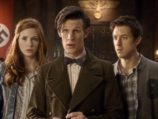 |
| Let's Kill Hitler |
|
 While still as intellectual as other Doctors, the Eleventh was sometimes a bit slow to realise details, such as when he took a while to register that the statues in the Maze of the Dead were Weeping Angels despite the obvious clue that the statues all had one head on a planet where the natives had possessed two heads before they died out ("The Time of Angels/Flesh and Stone"). Despite the occasional moment of stupidity, he could still come with various elaborate plans when put on the spot, such as when he was able to quickly draw up a plan to set a series of cameras to trap six Weeping Angels who had cornered him and his companions in a field ("Touched by an Angel"), or when he managed to prevent a nuclear detonation by using an accident that caused him to live time in reverse to undo the events that led to the explosion ("Nuclear Time"). At his peak, the Eleventh Doctor also demonstrated an ability to rapidly take in relatively small details about his surroundings and discover the key points that didn't fit ("The Eleventh Hour"), although he was prone to thinking aloud when stuck for ideas in the belief that he would come up with a plan when he had finished speaking. While he lacked the ability of the Third Doctor, Fourth Doctor and Eighth Doctor at hand-to-hand combat, the Eleventh was still reasonably capable when the situation required him to physically confront his foes, assaulting a Dalek with a wrench in a fit of rage ("Victory of the Daleks"), wielding a spear against the Silence ("The Wedding of River Song"), shooting a small target with a gun as part of a desperate plan to escape the Weeping Angels ("The Time of Angels/Flesh and Stone") and shifting into a fighting stance when hit by a football before he established that it was an accident ("The Rings of Akhaten"), as well as using a gun to threaten a wanted criminal when he was feeling particularly frustrated ("A Town Called Mercy"). He also demonstrated a knack for making gadgets when the situation required, such as assembling a new TARDIS console out of the remnants of hundreds of different models scattered around House's world in under eighteen minutes ("The Doctor's Wife"), putting together a non-technological 'scanner' when staying in Craig Owens' flat to investigate the strange events going on upstairs ("The Lodger"), and creating a teleportation device allowing him to swap places with Clyde Langer - an ally of his old companion Sarah Jane Smith - based on Clyde's previous exposure to the TARDIS's artron energy ("The Wedding of Sarah Jane Smith") while marooned on the wastelands of the Crimson Heart with only the scattered remains of various spaceships to work with ("Death of The Doctor"). While still as intellectual as other Doctors, the Eleventh was sometimes a bit slow to realise details, such as when he took a while to register that the statues in the Maze of the Dead were Weeping Angels despite the obvious clue that the statues all had one head on a planet where the natives had possessed two heads before they died out ("The Time of Angels/Flesh and Stone"). Despite the occasional moment of stupidity, he could still come with various elaborate plans when put on the spot, such as when he was able to quickly draw up a plan to set a series of cameras to trap six Weeping Angels who had cornered him and his companions in a field ("Touched by an Angel"), or when he managed to prevent a nuclear detonation by using an accident that caused him to live time in reverse to undo the events that led to the explosion ("Nuclear Time"). At his peak, the Eleventh Doctor also demonstrated an ability to rapidly take in relatively small details about his surroundings and discover the key points that didn't fit ("The Eleventh Hour"), although he was prone to thinking aloud when stuck for ideas in the belief that he would come up with a plan when he had finished speaking. While he lacked the ability of the Third Doctor, Fourth Doctor and Eighth Doctor at hand-to-hand combat, the Eleventh was still reasonably capable when the situation required him to physically confront his foes, assaulting a Dalek with a wrench in a fit of rage ("Victory of the Daleks"), wielding a spear against the Silence ("The Wedding of River Song"), shooting a small target with a gun as part of a desperate plan to escape the Weeping Angels ("The Time of Angels/Flesh and Stone") and shifting into a fighting stance when hit by a football before he established that it was an accident ("The Rings of Akhaten"), as well as using a gun to threaten a wanted criminal when he was feeling particularly frustrated ("A Town Called Mercy"). He also demonstrated a knack for making gadgets when the situation required, such as assembling a new TARDIS console out of the remnants of hundreds of different models scattered around House's world in under eighteen minutes ("The Doctor's Wife"), putting together a non-technological 'scanner' when staying in Craig Owens' flat to investigate the strange events going on upstairs ("The Lodger"), and creating a teleportation device allowing him to swap places with Clyde Langer - an ally of his old companion Sarah Jane Smith - based on Clyde's previous exposure to the TARDIS's artron energy ("The Wedding of Sarah Jane Smith") while marooned on the wastelands of the Crimson Heart with only the scattered remains of various spaceships to work with ("Death of The Doctor").
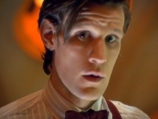 |
| The Girl Who Waited |
|
 As with his third and eighth selves ("Spearhead From Space" and "Doctor Who: The Movie"), the Eleventh Doctor claimed his initial set of clothes from the staff changing rooms of a hospital, taking a shirt, trousers, tweed jacket, suspenders, and bow tie from the changing rooms despite the objections of resident nurse Rory Williams ("The Eleventh Hour"), justifying the theft on the grounds that he had saved the planet once again. When questioned about the bow tie (Something that happened more than once), he defended it by claiming 'Bow ties are cool' despite others' objections, with his interest in 'cool' clothing extending to hats, as he attempted to wear a fez and a Stetson while proclaiming them as cool before River Song shot them both off ("The Pandorica Opens/The Big Bang" and "The Impossible Astronaut/Day of the Moon"). Unlike other incarnations, who tended to stick with the same general clothing choices throughout their lives except for varying the colour - such as the Fourth Doctor assuming a darker red outfit in his last season, the Sixth alternating between his multi-coloured coat and a blue version, and the Tenth varying between brown and blue suits -, the Eleventh's clothes went through various changes, such as occasionally wearing a long green overcoat instead of his original tweed jacket ("Let's Kill Hitler", "The Girl Who Waited" and "Closing Time"). When he lost Amy and Rory, he completely discarded his original clothes in favour of a more battered, darker outfit to reflect his sense of loss and grief, even disdaining his favoured bow ties ("The Snowmen"), but changed to a smarter burgundy coat and waistcoat with a patterned bow tie after meeting the original Clara Oswald and regaining his enthusiasm for adventure ("The Bells of Saint John"). As with his third and eighth selves ("Spearhead From Space" and "Doctor Who: The Movie"), the Eleventh Doctor claimed his initial set of clothes from the staff changing rooms of a hospital, taking a shirt, trousers, tweed jacket, suspenders, and bow tie from the changing rooms despite the objections of resident nurse Rory Williams ("The Eleventh Hour"), justifying the theft on the grounds that he had saved the planet once again. When questioned about the bow tie (Something that happened more than once), he defended it by claiming 'Bow ties are cool' despite others' objections, with his interest in 'cool' clothing extending to hats, as he attempted to wear a fez and a Stetson while proclaiming them as cool before River Song shot them both off ("The Pandorica Opens/The Big Bang" and "The Impossible Astronaut/Day of the Moon"). Unlike other incarnations, who tended to stick with the same general clothing choices throughout their lives except for varying the colour - such as the Fourth Doctor assuming a darker red outfit in his last season, the Sixth alternating between his multi-coloured coat and a blue version, and the Tenth varying between brown and blue suits -, the Eleventh's clothes went through various changes, such as occasionally wearing a long green overcoat instead of his original tweed jacket ("Let's Kill Hitler", "The Girl Who Waited" and "Closing Time"). When he lost Amy and Rory, he completely discarded his original clothes in favour of a more battered, darker outfit to reflect his sense of loss and grief, even disdaining his favoured bow ties ("The Snowmen"), but changed to a smarter burgundy coat and waistcoat with a patterned bow tie after meeting the original Clara Oswald and regaining his enthusiasm for adventure ("The Bells of Saint John").
 Where his immediate predecessor displayed a keen awareness of contemporary popular culture, the Eleventh Doctor sometimes appeared ignorant of the subtle nuances of human behaviour, such as dancing in a rather embarrassing/amusing manner at Amy and Rory's wedding ("The Pandorica Opens/The Big Bang") and expressing ignorance of why the married Amy and Rory didn't appreciate him giving them a bunk-bed in their room in the TARDIS ("The Doctor's Wife"), although he still retained a knowledge of more classic literature ("A Christmas Carol" and "The Snowmen"). He retained his general appreciation for Earth history, such as once appearing in a Laurel and Hardy film ("The Impossible Astronaut/Day of the Moon") or risking history to give Vincent van Gogh a chance to see how highly his work would be regarded in future after van Gogh helped them stop a near-invisible alien ("Vincent and The Doctor"). In keeping with this theme, the Eleventh Doctor seemed to be far more willing to alter history if he could get away with it by making various small changes, such as travelling back through the life of old miser Kazran Sardick to try and make him change his mind when he was the only person who could save Amy and Rory from a crashing ship ("A Christmas Carol"); a crisis involving an Oxford professor creating a time machine was actually averted because the Eleventh Doctor sent subtle messages to his past ten selves so that they could ensure that key events turned out as they should ("Destiny of The Doctor: The Time Machine"), such as Tegan making a profound impression on a planet so that they would share key knowledge with humanity later ("Destiny of The Doctor: Smoke and Mirrors"), the Second Doctor saving a scientist's research into a unique race ("Destiny of The Doctor: Shadow of Death") or the Eighth Doctor and Charley stopping an alien invasion before a key point ("Destiny of The Doctor: Enemy Aliens"). On a personal level, the Eleventh Doctor also demonstrated a fondness for children, quickly abandoning his initial attempt to claim to Amy on her first trip that he never got involved in problems when he saw a crying child ("The Beast Below"), later assuring a young boy who had just witnessed his father being taken into the ground by the Silurians that he was never scared of monsters by stating that the monsters were scared of him ("The Hungry Earth/Cold Blood"), and clearly enjoyed himself when he showed off various toys to children when he briefly worked in a department store to investigate possible alien activity ("Closing Time"). However, his childish enthusiasm was also reflected in a lack of patience, expressing his boredom when an investigation required him to simply sit and wait while Vincent van Gogh painted a picture of a church ("Vincent and The Doctor"), becoming so bored after spending an hour waiting for mysterious cubes to do something that he mowed a lawn, painted a fence, and kept a football off the ground for 20 000 kicks in a matter of minutes ("The Power of Three"), and once even shaved his head because he was bored ("The Time of The Doctor"). Where his immediate predecessor displayed a keen awareness of contemporary popular culture, the Eleventh Doctor sometimes appeared ignorant of the subtle nuances of human behaviour, such as dancing in a rather embarrassing/amusing manner at Amy and Rory's wedding ("The Pandorica Opens/The Big Bang") and expressing ignorance of why the married Amy and Rory didn't appreciate him giving them a bunk-bed in their room in the TARDIS ("The Doctor's Wife"), although he still retained a knowledge of more classic literature ("A Christmas Carol" and "The Snowmen"). He retained his general appreciation for Earth history, such as once appearing in a Laurel and Hardy film ("The Impossible Astronaut/Day of the Moon") or risking history to give Vincent van Gogh a chance to see how highly his work would be regarded in future after van Gogh helped them stop a near-invisible alien ("Vincent and The Doctor"). In keeping with this theme, the Eleventh Doctor seemed to be far more willing to alter history if he could get away with it by making various small changes, such as travelling back through the life of old miser Kazran Sardick to try and make him change his mind when he was the only person who could save Amy and Rory from a crashing ship ("A Christmas Carol"); a crisis involving an Oxford professor creating a time machine was actually averted because the Eleventh Doctor sent subtle messages to his past ten selves so that they could ensure that key events turned out as they should ("Destiny of The Doctor: The Time Machine"), such as Tegan making a profound impression on a planet so that they would share key knowledge with humanity later ("Destiny of The Doctor: Smoke and Mirrors"), the Second Doctor saving a scientist's research into a unique race ("Destiny of The Doctor: Shadow of Death") or the Eighth Doctor and Charley stopping an alien invasion before a key point ("Destiny of The Doctor: Enemy Aliens"). On a personal level, the Eleventh Doctor also demonstrated a fondness for children, quickly abandoning his initial attempt to claim to Amy on her first trip that he never got involved in problems when he saw a crying child ("The Beast Below"), later assuring a young boy who had just witnessed his father being taken into the ground by the Silurians that he was never scared of monsters by stating that the monsters were scared of him ("The Hungry Earth/Cold Blood"), and clearly enjoyed himself when he showed off various toys to children when he briefly worked in a department store to investigate possible alien activity ("Closing Time"). However, his childish enthusiasm was also reflected in a lack of patience, expressing his boredom when an investigation required him to simply sit and wait while Vincent van Gogh painted a picture of a church ("Vincent and The Doctor"), becoming so bored after spending an hour waiting for mysterious cubes to do something that he mowed a lawn, painted a fence, and kept a football off the ground for 20 000 kicks in a matter of minutes ("The Power of Three"), and once even shaved his head because he was bored ("The Time of The Doctor").
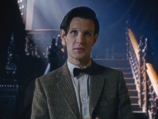 |
| The Doctor, The Widow and the Wardrobe |
|
 Although The Doctors had always cited their reasons for travel as being a straightforward desire to see the universe, the Eleventh Doctor was particularly passionate about travel, to the point where he became frustrated when he simply spent four days in one place while studying strange alien cubes ("The Power of Three"). Continuing this idea, he described his travels as running to things rather than running away from them, wanting to catch them before they faded and burnt out amid the chaos of the universe ("The Power of Three"), continuing his expressed distaste of endings ("The Angels Take Manhattan"). Ironically, he sometimes claimed that he needed companions because he had become too old to be truly passionate about anything any more ("Meanwhile in the TARDIS"), but he often proved himself wrong about his lack of passion, being moved to tears when he visited his old companions Amy and Rory for Christmas and learned that they had always set a place for him ("The Doctor, The Widow and the Wardrobe"). His attachment to his human companions was also reinforced when he was reunited with Ian and Barbara, The Doctor expressing immediate enthusiasm at the chance to travel with them once more even if they didn't initially recognise him, to the point where he served as Ian's best man at their wedding ("Hunters of the Burning Stone"). Although The Doctors had always cited their reasons for travel as being a straightforward desire to see the universe, the Eleventh Doctor was particularly passionate about travel, to the point where he became frustrated when he simply spent four days in one place while studying strange alien cubes ("The Power of Three"). Continuing this idea, he described his travels as running to things rather than running away from them, wanting to catch them before they faded and burnt out amid the chaos of the universe ("The Power of Three"), continuing his expressed distaste of endings ("The Angels Take Manhattan"). Ironically, he sometimes claimed that he needed companions because he had become too old to be truly passionate about anything any more ("Meanwhile in the TARDIS"), but he often proved himself wrong about his lack of passion, being moved to tears when he visited his old companions Amy and Rory for Christmas and learned that they had always set a place for him ("The Doctor, The Widow and the Wardrobe"). His attachment to his human companions was also reinforced when he was reunited with Ian and Barbara, The Doctor expressing immediate enthusiasm at the chance to travel with them once more even if they didn't initially recognise him, to the point where he served as Ian's best man at their wedding ("Hunters of the Burning Stone").
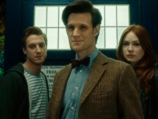 |
| The Power of Three |
|
 The Eleventh Doctor was keenly aware of his deeper feelings for his human friends; during a conversation with Amy Pond, he noted that he was spending so much time with her in particular because she was the first face he had ever seen in this incarnation and he wanted to spend every moment he could with her before she left ("The Power of Three"). This relationship was so deep that The Doctor kept coming back to Amy and Rory even after he had attempted to leave them behind ("The God Complex"), the two of them rejoining him for various other journeys even as they resumed their regular lives, while The Doctor in return spent some time staying on Earth with them to monitor an 'invasion' of anomalous alien cubes because he missed them ("The Power of Three"). When he believed that he had discovered evidence confirming that he was destined to die in a future trip, The Doctor initially attempted to escape his death by avoiding the time and place where it was destined to happen, but when his attempt to call The Brigadier for a visit resulted in him learning that The Brigadier had passed away a short while before his call, he recognised that time could even catch up with him despite his previous objections, clearly deeply affected by the news of his friend's death ("The Wedding of River Song"). Conversely, The Doctor greatly enjoyed the later opportunity to work with The Brigadier's daughter, Kate Lethbridge-Stewart, Kate having grown up on her father's stories of his friend to the point that she based her leadership style on The Doctor's example of 'science leads' ("The Power of Three"), even if her father's courage remained a key example for her ("The Day of The Doctor"). When The Doctor lost Amy and Rory due to the actions of the Weeping Angels ("The Angels Take Manhattan"), he briefly retired from his travels to Victorian London, having concluded that the universe was only interested in making him suffer despite everything he had done to protect it, but the efforts of Madame Vastra, Jenny, Strax and another version of Clara Oswald reminded him of his old enthusiasm for life ("The Snowmen"). The Eleventh Doctor was keenly aware of his deeper feelings for his human friends; during a conversation with Amy Pond, he noted that he was spending so much time with her in particular because she was the first face he had ever seen in this incarnation and he wanted to spend every moment he could with her before she left ("The Power of Three"). This relationship was so deep that The Doctor kept coming back to Amy and Rory even after he had attempted to leave them behind ("The God Complex"), the two of them rejoining him for various other journeys even as they resumed their regular lives, while The Doctor in return spent some time staying on Earth with them to monitor an 'invasion' of anomalous alien cubes because he missed them ("The Power of Three"). When he believed that he had discovered evidence confirming that he was destined to die in a future trip, The Doctor initially attempted to escape his death by avoiding the time and place where it was destined to happen, but when his attempt to call The Brigadier for a visit resulted in him learning that The Brigadier had passed away a short while before his call, he recognised that time could even catch up with him despite his previous objections, clearly deeply affected by the news of his friend's death ("The Wedding of River Song"). Conversely, The Doctor greatly enjoyed the later opportunity to work with The Brigadier's daughter, Kate Lethbridge-Stewart, Kate having grown up on her father's stories of his friend to the point that she based her leadership style on The Doctor's example of 'science leads' ("The Power of Three"), even if her father's courage remained a key example for her ("The Day of The Doctor"). When The Doctor lost Amy and Rory due to the actions of the Weeping Angels ("The Angels Take Manhattan"), he briefly retired from his travels to Victorian London, having concluded that the universe was only interested in making him suffer despite everything he had done to protect it, but the efforts of Madame Vastra, Jenny, Strax and another version of Clara Oswald reminded him of his old enthusiasm for life ("The Snowmen").
 The Eleventh Doctor's relationship with River Song was particularly complicated, starting with the temporally backwards nature of their interaction - he met her at her death in his previous incarnation ("Silence in the Library/Forest of the Dead") and subsequent met younger or older versions of her in no coherent order - and going on from there to learn of her original creation as a weapon for the Order of the Silence as a means of killing him before he could answer the First Question ("A Good Man Goes to War" and "The Time of The Doctor") until River's parents were able to convince her to help The Doctor ("Let's Kill Hitler"). Despite her willingness to use guns, The Doctor noted that he actually liked that part of River's personality ("The Impossible Astronaut/Day of the Moon") and showing no sign of asking her to stop (Albeit because she only ever used them when it was a life-or-death situation), often expressing an uncertain attraction for her despite his usual discomfort with romantic relationships. He even sacrificed some of his own regeneration energy to heal her of a broken wrist ("The Angels Take Manhattan"). However, it is unclear if their 'marriage' would actually count, considering that it took place in a pocket universe that never existed and was mainly done to allow him to tell River how he planned to fake his own death ("The Wedding of River Song"), as well as The Doctor often demonstrating an attraction to Clara Oswald even when he still described River as his wife ("Nightmare in Silver" and "The Name of The Doctor"). His interaction with Clara Oswald was also complicated, although this was due to the initial mystery of her presence as he had met two identical versions of her in two different timelines ("Asylum of the Daleks" and "The Snowmen") before he encountered the original Clara ("The Bells of Saint John"). When travelling with Clara, The Doctor initially considered her merely a puzzle to solve due to his meeting with her other selves, but he began to treat her as a person rather than a puzzle after a confrontation with her in a collapsing TARDIS confirmed that she had no actual control over whatever had happened to her ("Journey to the Centre of the TARDIS"). With the knowledge that she was not some deliberate trap, The Doctor became more openly affectionate to her, once introducing her as his wife as part of an attempt to investigate the mysterious Sweetville ("The Crimson Horror"), later proclaiming her to be his 'Impossible Girl' who could achieve the impossible ("The Name of The Doctor"). The Eleventh Doctor's relationship with River Song was particularly complicated, starting with the temporally backwards nature of their interaction - he met her at her death in his previous incarnation ("Silence in the Library/Forest of the Dead") and subsequent met younger or older versions of her in no coherent order - and going on from there to learn of her original creation as a weapon for the Order of the Silence as a means of killing him before he could answer the First Question ("A Good Man Goes to War" and "The Time of The Doctor") until River's parents were able to convince her to help The Doctor ("Let's Kill Hitler"). Despite her willingness to use guns, The Doctor noted that he actually liked that part of River's personality ("The Impossible Astronaut/Day of the Moon") and showing no sign of asking her to stop (Albeit because she only ever used them when it was a life-or-death situation), often expressing an uncertain attraction for her despite his usual discomfort with romantic relationships. He even sacrificed some of his own regeneration energy to heal her of a broken wrist ("The Angels Take Manhattan"). However, it is unclear if their 'marriage' would actually count, considering that it took place in a pocket universe that never existed and was mainly done to allow him to tell River how he planned to fake his own death ("The Wedding of River Song"), as well as The Doctor often demonstrating an attraction to Clara Oswald even when he still described River as his wife ("Nightmare in Silver" and "The Name of The Doctor"). His interaction with Clara Oswald was also complicated, although this was due to the initial mystery of her presence as he had met two identical versions of her in two different timelines ("Asylum of the Daleks" and "The Snowmen") before he encountered the original Clara ("The Bells of Saint John"). When travelling with Clara, The Doctor initially considered her merely a puzzle to solve due to his meeting with her other selves, but he began to treat her as a person rather than a puzzle after a confrontation with her in a collapsing TARDIS confirmed that she had no actual control over whatever had happened to her ("Journey to the Centre of the TARDIS"). With the knowledge that she was not some deliberate trap, The Doctor became more openly affectionate to her, once introducing her as his wife as part of an attempt to investigate the mysterious Sweetville ("The Crimson Horror"), later proclaiming her to be his 'Impossible Girl' who could achieve the impossible ("The Name of The Doctor").
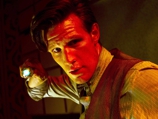 |
| Journey to the Centre of the TARDIS |
|
 Although The Doctor had managed to get over the more obvious source of his personal grief and guilt after his tenth incarnation's last adventure confirmed that he was right to destroy Gallifrey ("The End of Time"), he often displayed a disturbing sense of self-loathing, identifying the Dream Lord as his own dark side as only one person could hate him that much ("Amy's Choice"), and desperately following a potential lead to find other Time Lords in House's pocket universe before learning that he was only picking up their last distress calls because he wanted to be forgiven for what he had done ("The Doctor's Wife"). He also became convinced that his presence actually damaged his companions' lives rather than helping them; when the TARDIS attempted to generate a holographic voice-interface to help him when he was poisoned, he rejected images of Rose, Martha and Donna on the grounds that he wanted someone 'whose life [he] hadn't screwed up yet' ("Let's Kill Hitler"), and later deliberately destroyed Amy's faith in him and attempted to leave her and Rory on Earth because he was certain they would die if they continued to travel with him ("The God Complex"). Despite this, when interacting with a 'Ganger' duplicate of himself created by accident, The Doctor got on rather well with his clone once he had established their shared memory despite the rest of the group's distrust of the Ganger Doctor as they fought a research team's active Gangers ("The Rebel Flesh/The Almost People"), The Doctor finding it inspiring to interact with himself, the clone later giving his life to stop another Ganger. The ease with which he interacted with himself was further shown when he met with his tenth incarnation and the 'War Doctor' - The Doctor who actually fought in the Time War -, the Tenth and Eleventh Doctors quickly getting past their brief tension when the Tenth thought that the Eleventh had forgotten about the number of Time Lords he had killed while the Eleventh came to regard the War Doctor, long regarded as The Doctor who 'broke the promise' made when he chose his name, as really being 'The Doctor on the day that it was impossible to get it right' ("The Day of The Doctor"). During this alliance with his other selves, Clara stated that, while the War Doctor was the Warrior and the Tenth Doctor was the Hero, the Eleventh Doctor was simply The Doctor, her words inspiring The Doctor to find a way to rewrite the past and save Gallifrey by transferring it into a moment of stasis in a pocket parallel universe ("The Day of The Doctor"). Although The Doctor had managed to get over the more obvious source of his personal grief and guilt after his tenth incarnation's last adventure confirmed that he was right to destroy Gallifrey ("The End of Time"), he often displayed a disturbing sense of self-loathing, identifying the Dream Lord as his own dark side as only one person could hate him that much ("Amy's Choice"), and desperately following a potential lead to find other Time Lords in House's pocket universe before learning that he was only picking up their last distress calls because he wanted to be forgiven for what he had done ("The Doctor's Wife"). He also became convinced that his presence actually damaged his companions' lives rather than helping them; when the TARDIS attempted to generate a holographic voice-interface to help him when he was poisoned, he rejected images of Rose, Martha and Donna on the grounds that he wanted someone 'whose life [he] hadn't screwed up yet' ("Let's Kill Hitler"), and later deliberately destroyed Amy's faith in him and attempted to leave her and Rory on Earth because he was certain they would die if they continued to travel with him ("The God Complex"). Despite this, when interacting with a 'Ganger' duplicate of himself created by accident, The Doctor got on rather well with his clone once he had established their shared memory despite the rest of the group's distrust of the Ganger Doctor as they fought a research team's active Gangers ("The Rebel Flesh/The Almost People"), The Doctor finding it inspiring to interact with himself, the clone later giving his life to stop another Ganger. The ease with which he interacted with himself was further shown when he met with his tenth incarnation and the 'War Doctor' - The Doctor who actually fought in the Time War -, the Tenth and Eleventh Doctors quickly getting past their brief tension when the Tenth thought that the Eleventh had forgotten about the number of Time Lords he had killed while the Eleventh came to regard the War Doctor, long regarded as The Doctor who 'broke the promise' made when he chose his name, as really being 'The Doctor on the day that it was impossible to get it right' ("The Day of The Doctor"). During this alliance with his other selves, Clara stated that, while the War Doctor was the Warrior and the Tenth Doctor was the Hero, the Eleventh Doctor was simply The Doctor, her words inspiring The Doctor to find a way to rewrite the past and save Gallifrey by transferring it into a moment of stasis in a pocket parallel universe ("The Day of The Doctor").
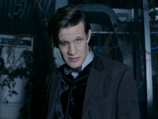 |
| The Name of The Doctor |
|
 While not prone to the same scale of manipulation and planning as his seventh incarnation, the Eleventh could still be cold when the situation called for it, such as when he spent months knowingly travelling with a Flesh duplicate of his companion Amy - essentially a clone that was being remotely controlled by Amy's consciousness - so that he could work out a means of tracing the original Amy ("The Rebel Flesh/The Almost People"). He later manipulated events so that an older version of Amy would be left behind to be erased from history after rescuing her younger self despite having initially promised to save both Amys ("The Girl Who Waited"), and even setting up events so that his companions would believe that he was dead to stop himself being hunted by the mysterious Silence ("The Wedding of River Song"). Despite this, his companions were still unfailingly loyal to him when he needed them; Clara even deliberately scattered herself across his timestream to save him from the latest attack of the Great Intelligence ("The Name of The Doctor"), and even when he doubted The Doctor Rory still showed faith in his plans to save Amy and the universe ("The Pandorica Opens/The Big Bang"). The Doctor's concerns about his influence on his companions was also proved wrong when he was reunited with his first incarnation's original companions Ian and Barbara during a confrontation with the powerful Prometheans, Ian in particular assuring The Doctor that he was a hero who inspired others through his willingness to die for them rather than a killer who turned others into monsters ("Hunters of the Burning Stone"). While not prone to the same scale of manipulation and planning as his seventh incarnation, the Eleventh could still be cold when the situation called for it, such as when he spent months knowingly travelling with a Flesh duplicate of his companion Amy - essentially a clone that was being remotely controlled by Amy's consciousness - so that he could work out a means of tracing the original Amy ("The Rebel Flesh/The Almost People"). He later manipulated events so that an older version of Amy would be left behind to be erased from history after rescuing her younger self despite having initially promised to save both Amys ("The Girl Who Waited"), and even setting up events so that his companions would believe that he was dead to stop himself being hunted by the mysterious Silence ("The Wedding of River Song"). Despite this, his companions were still unfailingly loyal to him when he needed them; Clara even deliberately scattered herself across his timestream to save him from the latest attack of the Great Intelligence ("The Name of The Doctor"), and even when he doubted The Doctor Rory still showed faith in his plans to save Amy and the universe ("The Pandorica Opens/The Big Bang"). The Doctor's concerns about his influence on his companions was also proved wrong when he was reunited with his first incarnation's original companions Ian and Barbara during a confrontation with the powerful Prometheans, Ian in particular assuring The Doctor that he was a hero who inspired others through his willingness to die for them rather than a killer who turned others into monsters ("Hunters of the Burning Stone").
 On at least two occasions, The Doctor convinced entire armies to retreat rather than face him even when they were prepared to fight him merely by informing them that he was there ("The Pandorica Opens/The Big Bang" and "A Good Man Goes to War"). Moments such as this, further reinforced by the discovery that the mysterious religious order known as 'the Silence' sought his death because of a prophecy that silence would fall if he ever answered 'the First Question, hidden in plain sight since the beginning of time, the question that must never ever be answered' ("The Wedding of River Song"), forced The Doctor to acknowledge the scale of the reputation that he had developed in the wider universe. Not only did he learn that some languages in the universe now believed that 'Doctor' meant 'mighty warrior' rather than 'healer' because of the example he had set ("A Good Man Goes to War"), but he discovered that a division of the Silence - led by the mysterious Madame Kovarian - had deliberately attempted to artificially engineer another Time Lord simply to use her as a weapon against him (Compared by some fans to the modern idea in 'Batman' comics that Batman created his foes by inspiring their methods through his own theatrical nature). Recognising that he had 'grown too big', The Doctor not only faked his death, but attempted to erase all records of him, with the Cybermen expressing ignorance of him during an encounter in the far future ("Nightmare in Silver"), and his former/future companion Clara Oswin Oswald literally erasing the Daleks' collective memory of him when she hacked the Dalek Ethernet ("Asylum of the Daleks"), although his long impact on Earth's history prevented him completely wiping out all his records there ("Hunters of the Burning Stone"). On at least two occasions, The Doctor convinced entire armies to retreat rather than face him even when they were prepared to fight him merely by informing them that he was there ("The Pandorica Opens/The Big Bang" and "A Good Man Goes to War"). Moments such as this, further reinforced by the discovery that the mysterious religious order known as 'the Silence' sought his death because of a prophecy that silence would fall if he ever answered 'the First Question, hidden in plain sight since the beginning of time, the question that must never ever be answered' ("The Wedding of River Song"), forced The Doctor to acknowledge the scale of the reputation that he had developed in the wider universe. Not only did he learn that some languages in the universe now believed that 'Doctor' meant 'mighty warrior' rather than 'healer' because of the example he had set ("A Good Man Goes to War"), but he discovered that a division of the Silence - led by the mysterious Madame Kovarian - had deliberately attempted to artificially engineer another Time Lord simply to use her as a weapon against him (Compared by some fans to the modern idea in 'Batman' comics that Batman created his foes by inspiring their methods through his own theatrical nature). Recognising that he had 'grown too big', The Doctor not only faked his death, but attempted to erase all records of him, with the Cybermen expressing ignorance of him during an encounter in the far future ("Nightmare in Silver"), and his former/future companion Clara Oswin Oswald literally erasing the Daleks' collective memory of him when she hacked the Dalek Ethernet ("Asylum of the Daleks"), although his long impact on Earth's history prevented him completely wiping out all his records there ("Hunters of the Burning Stone").
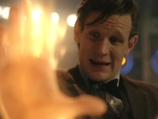 |
| The Time of The Doctor |
|
 Despite his successes in this life, the Eleventh Doctor was left plagued by two key mysteries throughout this incarnation; the origin of the cracks in time that he encountered in his first meeting with Amy - even after learning that the TARDIS caused the cracks when it exploded he still didn't know what made the explode ("The Pandorica Opens/The Big Bang") - and the mysterious Order of the Silence that sought his death to prevent him answering the question 'Doctor Who?' Both these questions were answered when The Doctor tracked a mysterious signal being sent throughout the universe to the planet Trenzalore - The Doctor only learning that he was now on Trenzalore after arriving, having earlier learned that this would be the location of his future grave ("The Name of The Doctor") - where he learned that it was coming from the last crack in the universe and contained a message from Gallifrey, the Time Lords seeking The Doctor to confirm his identity by speaking his name and letting them know that it was safe to return ("The Time of The Doctor"). With the Silence afraid of the consequences if the Time Lords returned when surrounded by so many opposing races that had also responded to the signal, but The Doctor unwilling to abandon Trenzalore and his people, the two were left in a state of cold war, The Doctor stuck on Trenzalore as he refused to abandon the planet and the Silence refused to let him restore Gallifrey (The Silence revealed in a later confrontation that a rogue branch had attempted to stop The Doctor by reaching back in time to destroy the TARDIS in the past, but had merely created the cracks that were allowing Gallifrey to escape, as well as their role in the creation of River Song ensuring that The Doctor would live to reach Trenzalore). The stalemate was finally broken when the Daleks managed to bypass the barrier around Trenzalore and the conflict reverted to open war, The Doctor unable to prevail even with the aid of the Silence against his assorted enemies, The Doctor's forces all dead while the Daleks retained at least one mothership, The Doctor now dying of old age and his regenerations exhausted. At the last minute, as The Doctor prepared to confront the Daleks before he died of old age, Clara spoke to the Time Lords through the crack, telling them that The Doctor's true name didn't matter as much as what he did as The Doctor as she begged them to aid him. With Clara's plea to inspire them, the Time Lords sacrificed this crack in order to save The Doctor by sending him enough energy to begin a new regeneration cycle, the resulting release of energy as his body processed its new ability to regenerate destroying the attacking Daleks. His death undone, The Doctor returned to the TARDIS, his youthful form temporarily restored as his body prepared to begin anew, taking a moment to call Clara's future self to ask her not to give up on his next incarnation, no matter how scary he might be ("Deep Breath"). As the present Clara returned to the TARDIS, the rejuvenated Doctor spoke to both Clara and a hallucination of Amy as he prepared to start his new regeneration cycle, assuring them that he would not forget his own time as The Doctor before he took off his trademark bow tie and regenerated for the thirteenth time, assuming the appearance of the Twelfth Doctor ("The Time of The Doctor"). Despite his successes in this life, the Eleventh Doctor was left plagued by two key mysteries throughout this incarnation; the origin of the cracks in time that he encountered in his first meeting with Amy - even after learning that the TARDIS caused the cracks when it exploded he still didn't know what made the explode ("The Pandorica Opens/The Big Bang") - and the mysterious Order of the Silence that sought his death to prevent him answering the question 'Doctor Who?' Both these questions were answered when The Doctor tracked a mysterious signal being sent throughout the universe to the planet Trenzalore - The Doctor only learning that he was now on Trenzalore after arriving, having earlier learned that this would be the location of his future grave ("The Name of The Doctor") - where he learned that it was coming from the last crack in the universe and contained a message from Gallifrey, the Time Lords seeking The Doctor to confirm his identity by speaking his name and letting them know that it was safe to return ("The Time of The Doctor"). With the Silence afraid of the consequences if the Time Lords returned when surrounded by so many opposing races that had also responded to the signal, but The Doctor unwilling to abandon Trenzalore and his people, the two were left in a state of cold war, The Doctor stuck on Trenzalore as he refused to abandon the planet and the Silence refused to let him restore Gallifrey (The Silence revealed in a later confrontation that a rogue branch had attempted to stop The Doctor by reaching back in time to destroy the TARDIS in the past, but had merely created the cracks that were allowing Gallifrey to escape, as well as their role in the creation of River Song ensuring that The Doctor would live to reach Trenzalore). The stalemate was finally broken when the Daleks managed to bypass the barrier around Trenzalore and the conflict reverted to open war, The Doctor unable to prevail even with the aid of the Silence against his assorted enemies, The Doctor's forces all dead while the Daleks retained at least one mothership, The Doctor now dying of old age and his regenerations exhausted. At the last minute, as The Doctor prepared to confront the Daleks before he died of old age, Clara spoke to the Time Lords through the crack, telling them that The Doctor's true name didn't matter as much as what he did as The Doctor as she begged them to aid him. With Clara's plea to inspire them, the Time Lords sacrificed this crack in order to save The Doctor by sending him enough energy to begin a new regeneration cycle, the resulting release of energy as his body processed its new ability to regenerate destroying the attacking Daleks. His death undone, The Doctor returned to the TARDIS, his youthful form temporarily restored as his body prepared to begin anew, taking a moment to call Clara's future self to ask her not to give up on his next incarnation, no matter how scary he might be ("Deep Breath"). As the present Clara returned to the TARDIS, the rejuvenated Doctor spoke to both Clara and a hallucination of Amy as he prepared to start his new regeneration cycle, assuring them that he would not forget his own time as The Doctor before he took off his trademark bow tie and regenerated for the thirteenth time, assuming the appearance of the Twelfth Doctor ("The Time of The Doctor").
|
|
|

